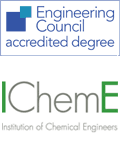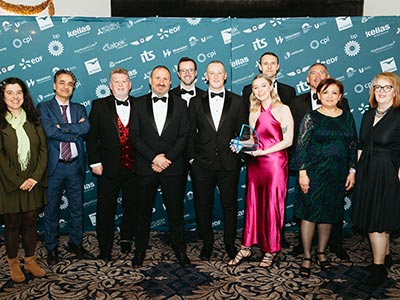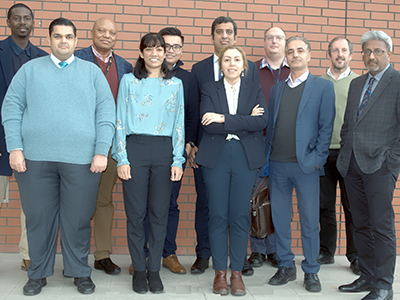Course overview
Accredited Foundation year Integrated masters Work placement
As a skilled professional, you develop processes to reduce hazardous and life-threatening emissions to the environment, improve energy efficiency and optimise the use of renewable resources and raw materials.
You develop sustainable solutions that protect the environment, assuring sound use of resources in line with the UN’s sustainable development goals, focusing on energy, water and climate action.
Top reasons to study chemical engineering at Teesside
- Financial awards: you may be eligible for a number of scholarships and awards.
- Maths support: strengthen your maths with a free online Mathematics for University course before you start your course.
- Industry links: we have long-term industrial links and joint projects with the top employers, offering you significant opportunities to gain practical experience and work on industry-focused projects.
- International visits: you have opportunities to travel internationally through student mobility visits or spending a semester studying abroad with one of our partners in countries such as China, the Czech Republic, Spain and Malaysia.
- Quality teaching: 94.1% of chemical, process and energy engineering students agreed that teaching staff supported their learning (National Student Survey 2024, tees.ac.uk/source).
Course details
Course structure
Year 1 core modules
This module introduces the range of mathematical skills that are relevant to an engineering degree. You revisit and develop your knowledge of the fundamentals of algebra, trigonometry and basic statistics. The central ideas of vectors, matrices, complex numbers, and differential and integral calculus are also examined.
Throughout the module you develop a range of mathematical skills and techniques fundamental to the solution of engineering problems. You also advance your skills in selecting and applying mathematical techniques.
This module is delivered through a combination of lectures and tutorial sessions.
Heat Transfer and Fluid Mechanics
You gain a fundamental knowledge of fluid flow through pipe-work systems and the associated design tasks. You are introduced to the techniques used to predict the behaviour of fluids in Chemical Engineering applications and investigate the differences between Newtonian and Non-Newtonian fluids.
The importance of stoichiometry, mass and energy balances and recycle operations is widely known and accepted in the chemical, biochemical and other related industries. You explore concepts and skills necessary to develop the skills necessary to work as a chemical engineer.
Practical Skills for Chemical Engineers
You work in a team in order to solve a process industry based problem. It gives you an understanding of your own knowledge and limitations and the importance of working with other people to solve a chemical engineering based problem. You gain a fundamental understanding of the operation of the chemical industry with respect to commercial project delivery; health and safety and ethical considerations.
Science for Chemical Engineers
This module introduces a range of key concepts in chemistry which provide a basis for understanding subsequent study in areas including analysing, synthesising and identifying compounds, and industrial production.
You learn about the nature of matter and why different substances behave the way they do. Understanding the properties of a substance is essential whether you’re designing a plant to manufacture it on a multi-tonne scale or working out how to alter its structure to improve its properties, for example as a drug or construction material. You also learn how the fundamental principles of chemical equilibrium, energetics and reaction rate are developed, and come to understand the prediction of reaction behaviour when process conditions are changed.
This is a 20-credit module.
Thermodynamics for Chemical Engineers
You explore the concepts of chemical engineering thermodynamics.
Develop an understanding of the engineering thermodynamic properties of pure working fluids. A series of thermodynamic principles are defined, developed and then applied to solve chemical engineering related problems of increasing difficulty, in particular derivation of the first and second laws of thermodynamics are explored and then applied to real world analysis of a range of heat-power cycles.
Year 2 core modules
You develop mathematical knowledge in differential equations and numerical methods and extend your base of techniques to solve a variety of problems which arise in engineering domains. The emphasis is on developing competence in the identification of the most appropriate method to solve a given problem and its subsequent application.
This module provides you with the opportunity to solve industrially relevant process design problems as part of a team. You develop employability skills such as project management, presentation of work, research and commercial awareness to support problem solving in a technical context.
You learn about the importance of control systems in industrial production processes, and describe fundamental concepts of linear control including feedback, Proportional-Integral-Derivative (PID) control, system dynamic response and controller tuning.
Mathematical modeling of systems based upon rate and balance equations are demonstrated, together with methods of designing feedback controllers. You use computer software to develop models of typical industrial systems and simulate their dynamic response under stated conditions.
Practical and Professional Skills
This module allows you to carry out appropriate experiments in support of mass transfer, heat transfer, reaction engineering and process control. This involves carrying out supervised experiments and producing appropriate reports in an approved format. You make some formal presentations to outline efficient laboratory reporting, error analysis techniques and preparation of risk assessments.
In most production units, chemical engineers separate the desired product from the other compounds and concentrate it to give the desired product specification.
You gain a sound understanding of mass transfer theory. You learn about mass and energy conservation and particle technology and the basic concepts behind the design and operation of mass-transfer equipment.
The core of most chemical processes is a chemical reactor to produce the desired product. Sometimes the components of the reaction may be biologically active.
You gain a sound understanding of the fundamental concepts of reaction engineering in chemical and biochemical systems. You make use of the essential knowledge of mass and energy conservation, reaction equilibria and kinetics and are introduced to the basic concepts behind the design of different types of chemical and biochemical reactors.
Optional work placement year
You have the option to spend one year in industry learning and developing your skills. We encourage and support you with applying for a placement, job hunting and networking.
You gain experience favoured by graduate recruiters and develop your technical skillset. You also obtain the transferable skills required in any professional environment, including communication, negotiation, teamwork, leadership, organisation, confidence, self-reliance, problem-solving, being able to work under pressure, and commercial awareness.
Many employers view a placement as a year-long interview, therefore placements are increasingly becoming an essential part of an organisation's pre-selection strategy in their graduate recruitment process. Benefits include:
· improved job prospects
· enhanced employment skills and improved career progression opportunities
· a higher starting salary than your full-time counterparts
· a better degree classification
· a richer CV
· a year's salary before completing your degree
· experience of workplace culture
· the opportunity to design and base your final-year project within a working environment.
If you are unable to secure a work placement with an employer, then you simply continue on a course without the work placement.
Final-year core modules
You broaden your knowledge and deepen your understanding of process unit operations and the underpinning science. It provides you with design methodologies for complex unit operations involving multicomponent distillation, liquid-liquid extraction, gas absorption, membrane processes and chromatography. You gain an in-depth understanding of the application of thermodynamics to mixtures.
Chemical Engineering in Industry
Develop your appreciation and understanding of process safety, and learn to broaden your understanding of the current industrial landscape of chemical engineering.
Consider the design work introduced throughout the course in to a single cohesive design exercise. Explore the requirements set down for process design degrees by the Institution of Chemical Engineers (IChemE).
The project follows standard industrial design methodologies from initial design brief through to complete design of a chemical process.
Environment and Sustainable Processing
You explore the environmental impact of industrial and human activity, and the need for a sustainable approach for environmental engineering solutions. You examine sustainable strategies for air, water and land pollution, focussing on environmental management and sustainable engineering.
This is a 20-credit module.
You develop your understanding of reaction engineering and apply your knowledge to complex and multi-phase reactions/reactors systems. You are also introduced to catalyst preparation and characterisation, and the use of catalysis in reaction engineering.
Modules offered may vary.
How you learn
You learn through lectures, seminars and hands-on lab sessions. You are also expected to undertake self-guided study time to review lecture notes, prepare coursework assignments, work on projects and revise for assessments.
Some of your learning is based around case studies, following visits to local industries.
Intensive problem-solving weeks involve you working as part of a team to find a solution to an engineering problem, helping you enhance your team-working, communication, leadership and other transferrable skills.
Chemical Engineering facilities:
Within the engineering department we have world class chemical engineering facilities for teaching and research. All our labs are equipped with state-of-the-art experimental equipment and follow strict operational, hazard and safety regulations to ensure a safe working environment.
• Pilot laboratory.
• Unit process and operation laboratory.
• Wet laboratory.
• Hydrogen laboratory.
• Greenhouse gas separations laboratory.
• Process design, modelling and simulation laboratory.
• Biochar and water treatment laboratory.
How you are assessed
You are assessed through coursework assignments, project reports, lab reports, presentations and formal exams.
Our Disability Services team provide an inclusive and empowering learning environment and have specialist staff to support disabled students access any additional tailored resources needed. If you have a specific learning difficulty, mental health condition, autism, sensory impairment, chronic health condition or any other disability please contact a Disability Services as early as possible.
Find out more about our disability services
Find out more about financial support
Find out more about our course related costs
Entry requirements
Entry requirements
96-112 points including maths, from any combination of acceptable Level 3 qualifications. Examples include A-level. BTEC, Access to HE Diplomas , Scottish and Irish Highers, T-Level, or the International Baccalaureate.
We accept the following T-Levels:
- Design and Development for Engineering and Manufacturing
- Design, Surveying and Planning for Construction (specialism Civil Engineering)
- Maintenance, Installation and Repair for Engineering and Manufacturing from City & Guilds.
Find out how many points your qualifications are worth using the UCAS tariff calculator.
Accredited prior learning
You may be able to join onto year two or three if you’ve studied a HNC or HND. If you don’t have a qualification but have gained relevant credits at Level 4 in a related subject, then credit transfer may be possible.
Alternative routes into this course are available if you have not met the entry requirements as listed.
International students who need a student visa to study in the UK should check our international web pages on acceptable international qualifications and UKVI-compliant English language requirements.
For general information please see our overview of entry requirements.
International applicants can find out what qualifications they need by visiting Your Country.
You can gain considerable knowledge from work, volunteering and life. Under recognition of prior learning (RPL) you may be awarded credit for this which can be credited towards the course you want to study.
Find out more about RPL
Employability
Career opportunities
Our graduates are working across sectors including; pharmaceutical, energy, recycling, battery production, pulp and paper, cement, fertilisers, chemical, food production, biochemical production/biotechnology, and consultancy companies.
As the world transits to sustainable and green technologies many new areas have emerged that need chemical engineers, these include hydrogen-ammonia economy, biofuels, emission mitigation, and novel materials. The sector-wise distribution of chemical engineers employed in different sectors such as oil, gas, nuclear, water, manufacturing and pharmaceutical.
You graduate qualified to work within research and the development of innovative and sustainable products and processes, production and process technologies and advanced technical support. Typical roles involve process engineers, sustainability managers, production in-charge, waste/energy managers, waste minimisation specialists, energy monitoring consultants, research scientist, environmental or carbon management officers, and government advisors.
The course trains you to start your own company or join a start-up. As a chemical engineer, you are trained to draw on resources and ideas from a variety of fields, making you adaptable, creative and able to thrive in a fast-paced start-up environment.
Information for international applicants
Qualifications
International applicants - find out what qualifications you need by selecting your country below.
Select your country:
Useful information
Visit our international pages for useful information for non-UK students and applicants.













